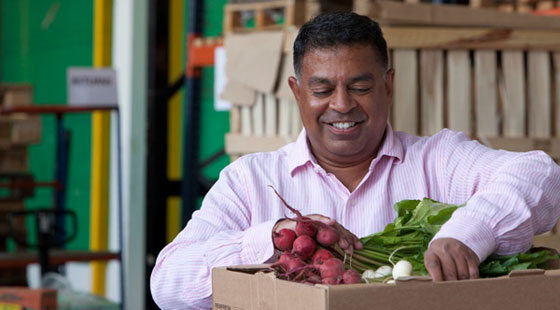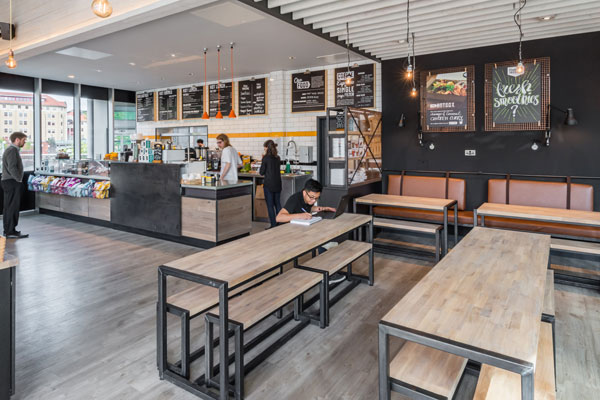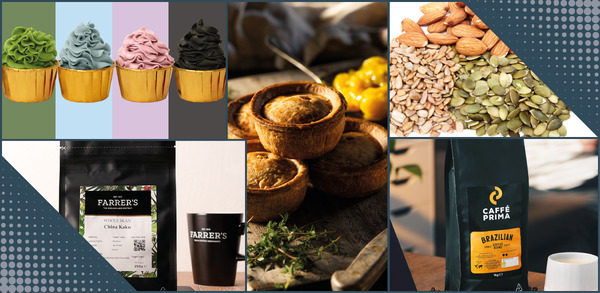The whole nine yards: what can your wholesaler do for you
With price inflation gathering pace and supply disruptions breaking out, caterers need wholesalers who can deliver economically and reliably. John Porter reports on what your wholesaler can do for you
It’s fair to say that the economic signals being beamed at the hospitality industry are, at the least, cause for concern. While the Bank of England’s most recent quarterly forecast, published in February, predicted 2% growth for the UK economy this year, at the same time the bank warned that consumer spending is likely to slow down as the combination of rising inflation and low wage growth hits disposable income.
Figures more specific to the catering sector have come from the purchasing specialists who work closely with industry wholesalers.
The CGA Prestige Foodservice Price Index reported that foodservice price inflation hit 3.7% in February, while the Lynx Purchasing Market Forecast analysis of a basket of goods routinely bought by operators showed a 9% year-on-year increase between March 2016 and March 2017.
Trade bodies have also weighed in. The Wine and Spirit Trade Association, for example, has warned that the combination of the post-Brexit devaluation of sterling and the Bank of England inflation forecast will add 46p to an average bottle of wine.
Eat, drink and be merry…
The prospect of times becoming tougher seems to have prompted some consumers to prioritise booking a table at the last chance saloon over longer-term spending. The Coffer Peach Business Tracker for February 2017 showed a 1.7% increase in like-for-like sales in managed pubs and restaurants. In contrast, retailers such as Next have bemoaned the fact that consumers are choosing going out to eat over purchases such as clothes.
Whether this is a longer-term trend or simply a blip is the key issue for operators and suppliers to predict as they plan menus. Stuck in the middle are the wholesalers, who have to manage the foodservice supply chain in circumstances that can change quickly.
"The eating out market has remained fairly robust," says Sarah Wilkinson, head of desserts, bakery, deli and meal solutions at Brakes.
"The worst fears around the Brexit vote have not materialised, and the UK economy has remained resilient, with GDP growth anticipated this year." But she warns: "The increasing cost of goods from Europe and beyond is likely to have an impact on food price inflation. While the scale and global sourcing ability of Brakes have, to an extent, mitigated some of this, the challenge will remain."
In the first few months of 2017, a shortfall in fresh produce from Spain and an industrial dispute in the Icelandic fishing fleet demonstrated how quickly problems in the supply chain can escalate in an inflationary market.
One issue for operators when such challenges arise is whether to stick with the wholesaler they know or to shop around for the best deals.
Jo Ennion, client services director at procurement specialist Procure4, advises operators to "keep the dialogue open with more than one wholesaler, so you get a consistent story on price increases. It is important, now more than ever, to keep a flexible supply chain so that it is possible to change product or supplier quickly.

Wholesalers, perhaps understandably, advise operators to exercise caution before shopping around too enthusiastically. Chris Beckley, managing director of KFF, says: âWhen selecting a wholesaler, price is important, but almost secondary to service and the relationship a caterer will have with a wholesaler.
Itâs all very well purchasing the cheapest chip, for example, but if it is constantly out of stock or not delivered in time, it may result in caterers panic buying at higher prices, therefore in the long run it is not sustainable.
âCaterers should work together with their chosen wholesaler and see them more as a partner than a supplier. We regularly review our products to make sure they are the best in the market, which we offer to our clients at competitive, sustainable prices.â
New product development is one key way for wholesalers to show they add value for operators over and above price. Alice Bexon, purchasing manager at Beacon, says: âWeâre seeing an increasing number of national food wholesalers, such as Brakes and Bidfood, investing significantly in development kitchens. Customers can come into the kitchen and spend time with the development chefs to get inspiration on new menu ideas.â
Rob Owen, executive development chef at Creed Foodservice, sets out what a wholesaler partnership can do: âI provide ongoing menu and concept development support to our customers. I help them develop high-quality, on-trend meals and solutions, including street food and other hot grab-and-go options. I also assist with category and product reviews, pickup-point reviews, and the development of new serving concepts.â
Farm to fork â" fast
This added-value approach is echoed by Vernon Mascarenhas of First Choice Produce, based in Londonâs New Covent Garden Market. He says: âSpecialist wholesalers can give you what we call âday 1 for day 2â â" where produce comes in from the farm and is in the kitchen by the next morning. The difference is how quick we can harvest that veg and get it onto the plate. We are talking hours, not days.â

First Choice customer Jesse Dunford Wood, chef at Parlour restaurant in Kensal Rise, London, says: âVernon brings baskets of treats that we might not normally see. He knows what will be interesting to a particular chef, and that personal contact is key. Especially in fruit and veg, where produce changes seasonally, even daily, you need that direct link with your supplier. They know whatâs hot and whatâs not, whatâs high or low in price, and what to try. We are constantly introduced to new products, and that is so important for our menus.â
For a supplier such as New Forest Ice Cream, the use of a network of wholesalers âallows us to logistically manage national distribution, supplying ice-cream to customers throughout the industryâ, says director Christina Veal. âWe can ensure that our ice-cream remains frozen at all times because our chosen wholesalers meet strict storage regulations and deliver using the latest, highly insulated transport designed especially for delivering frozen produce.â
Case study: Friska Food
Bristol-based café operator Friska Food offers âhealthy fast foodâ thatâs reasonably priced, globally influenced and locally sourced. With a range of standalone sites
and concessions in its home city, an opening in Birmingham meant Friska required a food wholesaler to service its existing sites as well as new ventures further north.
Friska turned to Creed Foodservice to assist it in consolidating supply. With depots in Gloucestershire and Ilkeston, Creed was ideally placed to serve both the existing Bristol businesses and new sites.

It now supplies Friska with grocery, and frozen and chilled produce, consolidating the operatorâs sourcing and the number of deliveries made to each of its sites.
Griff Holland, co-founder of Friska, says: âManaging the kitchen admin has been far easier since consolidating our ordering. As we expand, this will be even more important. Quality and responsible sourcing are really important to this business, and Creedâs own values regarding commitment to quality, sustainable and ethical sourcing, and green issues are synonymous with our own.â
Recent product launches
⢠Bestway Wholesale has released the Essentially Cleaning range â" a set of 40 professionally formulated products focused on the foodservice market, clearly
colour-coded across seven different areas: kitchen, floorcare, dishwashing, bar and cellar, housekeeping, washroom, and laundry.
⢠Brakes has introduced a beef rib with salt and pepper (pictured), slow-cooked for six hours before it reaches customers to ensure the meat is tender and the flavour strong. The rib is reheated by the customer, removing the time and labour elements associated with preparation, but still delivering a premium product.
⢠From Country Range comes a trio of dressings targeting summer menus. Honey & Mustard Dressing is blended to give the perfect balance of sweet and savoury and can be drizzled over fresh greens or used to glaze gammon. Ranch Dressing has mild garlic undertones and a smooth buttery texture and can be drizzled over grilled prawn skewers, to add oomph to a club sandwich or used as a dip. Citrus & White Balsamic Dressing (pictured) has subtle sweetness and a peppery acidic finish for serving with crispy and crunchy salads or to give fish a
tangy lift. All are available in 2.5-litre jars in cases of two.
â¢Â KFF has expanded its Burger Bar offer with three Dirty Burger options. There is the Dâoh-nut burger â" two burger patties, streaky bacon, Emmental cheese, mustard, barbecue sauce and a couple of sugar ring doughnuts. The Black and Blue Part 2 burger (pictured) combines three buns, chilli, kidney beans, blue cheese, salsa, guacamole and a helping of sweet potato fries. And the Smokinâ Swine is a hot and smoky burger piled high with two beef patties, Purple Pineapple BBQ pulled pork filling, spicy Mexicana cheese, jalapeño chillies, breaded dill pickles, soured cream and coleslaw.
Wholesalers
Beacon Purchasing www.beaconpurchasing.co.uk
Bestway Wholesale www.bbfoodservice.co.uk
Bidfood www.bidvest.co.uk
Brakes www.brake.co.uk
Country Range www.countryrange.co.uk
Creed Foodservice www.creedfoodservice.co.uk
First Choice Produce www.firstchoice-produce.com
KFF www.kff.co.uk
Lynx Purchasing www.lynxpurchasing.co.uk
New Covent Garden Market www.newcoventgardenmarket.com
Prestige Purchasing www.prestige-purchasing.com
Procure4 www.procure4.com

















